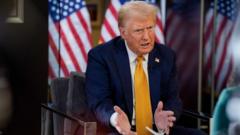In a wide-ranging NBC interview, President-elect Donald Trump reaffirmed his intention to end birthright citizenship and promised to issue a series of executive orders on his first day in office, including pardons for those involved in the Capitol riot.
Trump's Vision for Immigration Reform and Potential Executive Actions

Trump's Vision for Immigration Reform and Potential Executive Actions
President-elect Donald Trump outlines ambitious plans for immigration policy and controversial promises during a recent interview.
In his first major broadcast interview since securing victory in the November elections, President-elect Donald Trump laid out an ambitious and contentious agenda for his upcoming term, set to begin in January. Speaking with NBC's Meet the Press, he announced bold plans to dismantle the concept of birthright citizenship, which grants automatic citizenship to anyone born on US soil. Trump characterized the practice as "ridiculous" and expressed intentions to take swift action upon assuming office.
However, any attempt to eliminate birthright citizenship faces significant constitutional challenges, given that it is embedded in the 14th Amendment. Such a move would likely lead to immediate legal battles, given the high barriers to amending the Constitution, which requires supermajority approval from Congress and ratification from three-fourths of state legislatures.
Trump's interview also touched on his intention to pardon individuals involved in the January 6 Capitol riot, suggesting a quick review of cases. "We're going to look at independent cases," he stated, indicating a readiness to act on this issue right from day one. He reflected on the treatment of the convicted rioters, asserting, "They've been in there for years, and they're in a filthy, disgusting place that shouldn't even be allowed to be open."
In addition to immigration and pardons, Trump reiterated his plans for mass deportation of undocumented immigrants, though he expressed willingness to collaborate with Democrats to protect those who came to the US as children under the Deferred Action for Childhood Arrivals (DACA) program.
Amidst this discussion, Trump also addressed foreign policy, stating that continued US commitment to NATO would depend on alliance members fulfilling financial obligations. Regarding abortion, he indicated no intention to impose restrictions on abortion pills while leaving room for future changes.
On the topic of autism and vaccines, Trump expressed a desire to explore potential links despite overwhelming scientific consensus dismissing such theories. His health secretary nominee, Robert F. Kennedy Jr., is noted for his vaccine skepticism, further complicating public trust in health initiatives.
While Trump declared that he would refrain from pursuing investigations against political adversaries like President Biden, he did not shy away from suggesting that several lawmakers involved in investigating him should face jail time.
As he prepares to take office once more, Trump's extensive plans include a potential overhaul of various policies, leaving observers curious about the ramifications for both domestic and international issues.




















